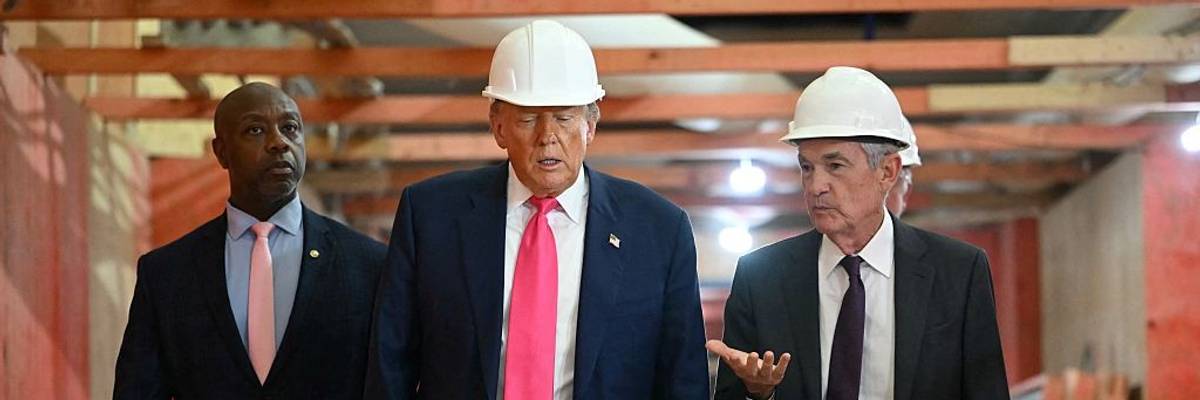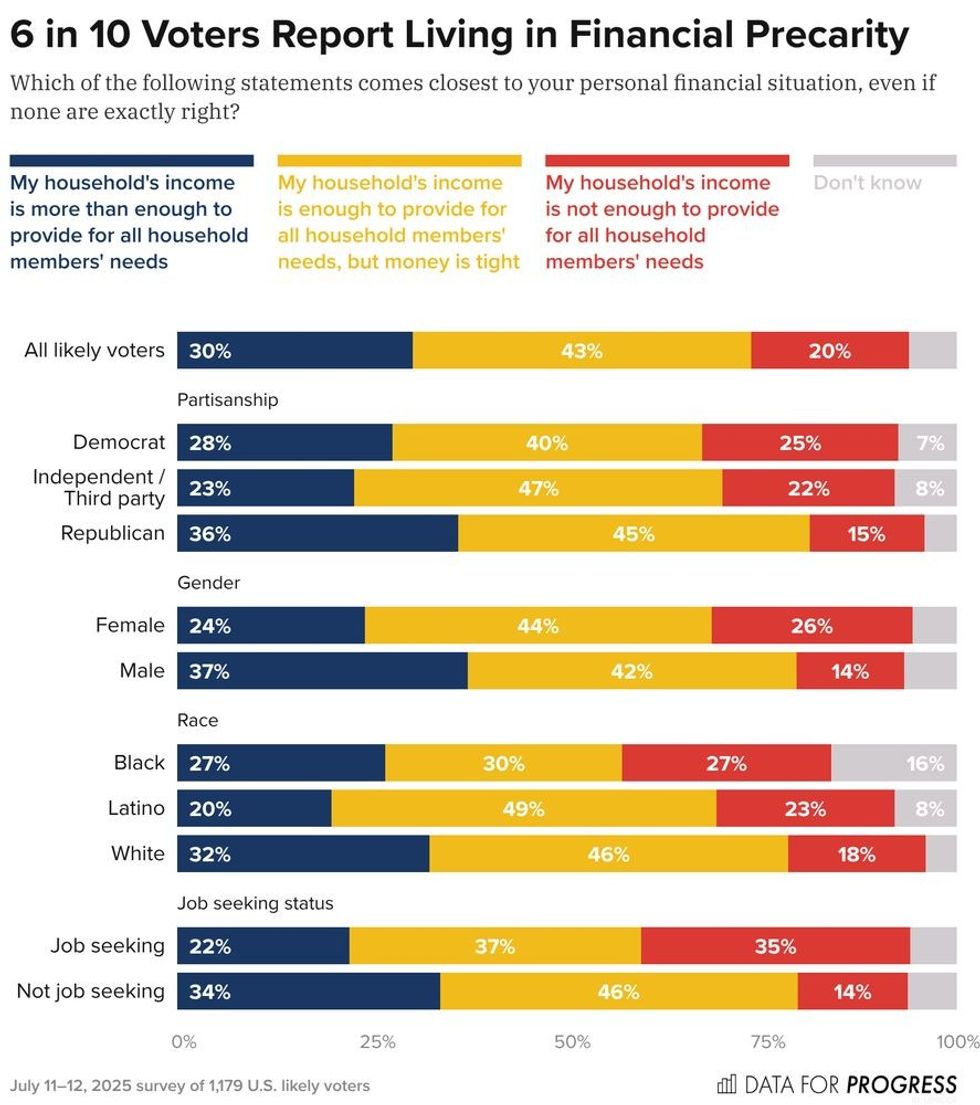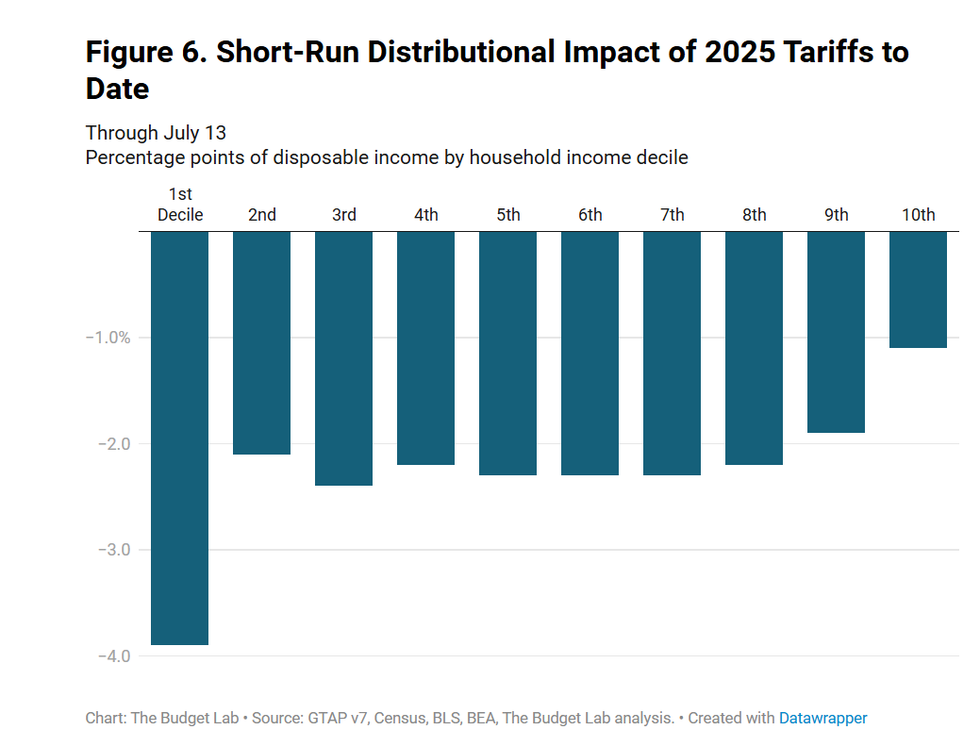

SUBSCRIBE TO OUR FREE NEWSLETTER
Daily news & progressive opinion—funded by the people, not the corporations—delivered straight to your inbox.
5
#000000
#FFFFFF
To donate by check, phone, or other method, see our More Ways to Give page.


Daily news & progressive opinion—funded by the people, not the corporations—delivered straight to your inbox.

U.S. President Donald Trump walks with Federal Reserve Chair Jerome Powell (R) and US Sen. Tim Scott (L), Republican of South Carolina, as he visits the Federal Reserve in Washington, D.C., on July 24, 2025.
Amid intensifying tariffs, just 30% of Americans say they can afford the cost of living, according to a poll from Data for Progress.
The White House says the U.S. is in the midst of an "economic boom" under President Donald Trump. But voters aren't feeling it in their wallets.
Polling released by Gallup Thursday found the president's approval rating at just 37%, the lowest point of his second term so far, with an all-time low approval rating of 29% among independents.
This precipitous decline has been helped along by sagging approval on the economy, which has historically been the issue where he gets the most support. After a high of 42% in February, approval for his handling of the economy is likewise down to just 37%.
An uptick in inflation seen over the past month has exacerbated the cost of living crisis Trump promised to abate on the campaign trail.
A poll released Friday by Data for Progress found that, "Only 30% of likely voters report having enough income to be able to comfortably provide for their household's needs, while a plurality of voters (43%) say they have enough income but money is tight, and 20% say they do not make enough to provide for all household members' needs."

"As his approval tanks, President Trump has finally lost voters on the one issue where they've historically trusted him: the economy," said Lindsay Owens, the executive director of the Groundwork Collaborative. "Not only has Trump shirked his promise to lower prices, he's made the situation substantially worse as his tax and tariff policies have landed a double blow to household budgets."
According to data from Indeed, cited by Forbes, 43% of Americans have seen their wages lagging behind the cost of living over the past year. The jobs feeling the worst crunch are those "at the low-to-middle end of the pay spectrum."
Trump has imposed the highest tariffs on imported goods since the Great Depression. After months of relative quiet, they began to make their impact felt this past month, with consumer prices up 2.7% from the previous year, compared with just 2.4% in May.
While rising rent costs were the top driver of inflation in June, prices for clothing, toys, and consumer appliances all rose, as did food and energy.
The president was elected on promises to tackle the cost of living. But now 70% say that he is not focused enough on lowering prices, according to polling released Sunday by CBS News. Meanwhile, 61% say Trump is focusing too much on his tariff policy, which remains broadly unpopular.
Yale's Budget Lab estimates that it would cost the average household $2,770 worth of disposable income per year if tariffs stayed at their current rate indefinitely, with the worst impact—especially in the short term—on the poorest Americans.

But they are set to grow more intense beginning on August 1, when Trump has said he'll roll out new levies on imports from some of America's top trading partners, including Canada, the European Union, Mexico, Brazil, and South Korea.
According to economists who spoke with Vox, the worst effects are likely yet to come. Preston Caldwell, chief U.S. economist for Morningstar, said inflation would likely peak in 2026 rather than 2025.
"Companies have started paying tariffs on their imported goods, but as far as the goods that are being sold in stores right now, those are primarily being drawn from the inventory of goods that were brought in before the tariffs," Caldwell said. "So most companies are still not really having to recognize the loss of tariffs yet to a great degree."
"The more that it becomes clear that tariffs are here for at least the foreseeable future," he continued, "the more that they are going to have to eventually adjust to this new reality, which will entail increasing their prices."
Owens said that will likely translate to even fiercer backlash against Trump.
"Working families," she said, "know exactly who to blame as they pay higher prices on everything from groceries and electricity bills to school supplies and appliances."
Dear Common Dreams reader, The U.S. is on a fast track to authoritarianism like nothing I've ever seen. Meanwhile, corporate news outlets are utterly capitulating to Trump, twisting their coverage to avoid drawing his ire while lining up to stuff cash in his pockets. That's why I believe that Common Dreams is doing the best and most consequential reporting that we've ever done. Our small but mighty team is a progressive reporting powerhouse, covering the news every day that the corporate media never will. Our mission has always been simple: To inform. To inspire. And to ignite change for the common good. Now here's the key piece that I want all our readers to understand: None of this would be possible without your financial support. That's not just some fundraising cliche. It's the absolute and literal truth. We don't accept corporate advertising and never will. We don't have a paywall because we don't think people should be blocked from critical news based on their ability to pay. Everything we do is funded by the donations of readers like you. Will you donate now to help power the nonprofit, independent reporting of Common Dreams? Thank you for being a vital member of our community. Together, we can keep independent journalism alive when it’s needed most. - Craig Brown, Co-founder |
The White House says the U.S. is in the midst of an "economic boom" under President Donald Trump. But voters aren't feeling it in their wallets.
Polling released by Gallup Thursday found the president's approval rating at just 37%, the lowest point of his second term so far, with an all-time low approval rating of 29% among independents.
This precipitous decline has been helped along by sagging approval on the economy, which has historically been the issue where he gets the most support. After a high of 42% in February, approval for his handling of the economy is likewise down to just 37%.
An uptick in inflation seen over the past month has exacerbated the cost of living crisis Trump promised to abate on the campaign trail.
A poll released Friday by Data for Progress found that, "Only 30% of likely voters report having enough income to be able to comfortably provide for their household's needs, while a plurality of voters (43%) say they have enough income but money is tight, and 20% say they do not make enough to provide for all household members' needs."

"As his approval tanks, President Trump has finally lost voters on the one issue where they've historically trusted him: the economy," said Lindsay Owens, the executive director of the Groundwork Collaborative. "Not only has Trump shirked his promise to lower prices, he's made the situation substantially worse as his tax and tariff policies have landed a double blow to household budgets."
According to data from Indeed, cited by Forbes, 43% of Americans have seen their wages lagging behind the cost of living over the past year. The jobs feeling the worst crunch are those "at the low-to-middle end of the pay spectrum."
Trump has imposed the highest tariffs on imported goods since the Great Depression. After months of relative quiet, they began to make their impact felt this past month, with consumer prices up 2.7% from the previous year, compared with just 2.4% in May.
While rising rent costs were the top driver of inflation in June, prices for clothing, toys, and consumer appliances all rose, as did food and energy.
The president was elected on promises to tackle the cost of living. But now 70% say that he is not focused enough on lowering prices, according to polling released Sunday by CBS News. Meanwhile, 61% say Trump is focusing too much on his tariff policy, which remains broadly unpopular.
Yale's Budget Lab estimates that it would cost the average household $2,770 worth of disposable income per year if tariffs stayed at their current rate indefinitely, with the worst impact—especially in the short term—on the poorest Americans.

But they are set to grow more intense beginning on August 1, when Trump has said he'll roll out new levies on imports from some of America's top trading partners, including Canada, the European Union, Mexico, Brazil, and South Korea.
According to economists who spoke with Vox, the worst effects are likely yet to come. Preston Caldwell, chief U.S. economist for Morningstar, said inflation would likely peak in 2026 rather than 2025.
"Companies have started paying tariffs on their imported goods, but as far as the goods that are being sold in stores right now, those are primarily being drawn from the inventory of goods that were brought in before the tariffs," Caldwell said. "So most companies are still not really having to recognize the loss of tariffs yet to a great degree."
"The more that it becomes clear that tariffs are here for at least the foreseeable future," he continued, "the more that they are going to have to eventually adjust to this new reality, which will entail increasing their prices."
Owens said that will likely translate to even fiercer backlash against Trump.
"Working families," she said, "know exactly who to blame as they pay higher prices on everything from groceries and electricity bills to school supplies and appliances."
The White House says the U.S. is in the midst of an "economic boom" under President Donald Trump. But voters aren't feeling it in their wallets.
Polling released by Gallup Thursday found the president's approval rating at just 37%, the lowest point of his second term so far, with an all-time low approval rating of 29% among independents.
This precipitous decline has been helped along by sagging approval on the economy, which has historically been the issue where he gets the most support. After a high of 42% in February, approval for his handling of the economy is likewise down to just 37%.
An uptick in inflation seen over the past month has exacerbated the cost of living crisis Trump promised to abate on the campaign trail.
A poll released Friday by Data for Progress found that, "Only 30% of likely voters report having enough income to be able to comfortably provide for their household's needs, while a plurality of voters (43%) say they have enough income but money is tight, and 20% say they do not make enough to provide for all household members' needs."

"As his approval tanks, President Trump has finally lost voters on the one issue where they've historically trusted him: the economy," said Lindsay Owens, the executive director of the Groundwork Collaborative. "Not only has Trump shirked his promise to lower prices, he's made the situation substantially worse as his tax and tariff policies have landed a double blow to household budgets."
According to data from Indeed, cited by Forbes, 43% of Americans have seen their wages lagging behind the cost of living over the past year. The jobs feeling the worst crunch are those "at the low-to-middle end of the pay spectrum."
Trump has imposed the highest tariffs on imported goods since the Great Depression. After months of relative quiet, they began to make their impact felt this past month, with consumer prices up 2.7% from the previous year, compared with just 2.4% in May.
While rising rent costs were the top driver of inflation in June, prices for clothing, toys, and consumer appliances all rose, as did food and energy.
The president was elected on promises to tackle the cost of living. But now 70% say that he is not focused enough on lowering prices, according to polling released Sunday by CBS News. Meanwhile, 61% say Trump is focusing too much on his tariff policy, which remains broadly unpopular.
Yale's Budget Lab estimates that it would cost the average household $2,770 worth of disposable income per year if tariffs stayed at their current rate indefinitely, with the worst impact—especially in the short term—on the poorest Americans.

But they are set to grow more intense beginning on August 1, when Trump has said he'll roll out new levies on imports from some of America's top trading partners, including Canada, the European Union, Mexico, Brazil, and South Korea.
According to economists who spoke with Vox, the worst effects are likely yet to come. Preston Caldwell, chief U.S. economist for Morningstar, said inflation would likely peak in 2026 rather than 2025.
"Companies have started paying tariffs on their imported goods, but as far as the goods that are being sold in stores right now, those are primarily being drawn from the inventory of goods that were brought in before the tariffs," Caldwell said. "So most companies are still not really having to recognize the loss of tariffs yet to a great degree."
"The more that it becomes clear that tariffs are here for at least the foreseeable future," he continued, "the more that they are going to have to eventually adjust to this new reality, which will entail increasing their prices."
Owens said that will likely translate to even fiercer backlash against Trump.
"Working families," she said, "know exactly who to blame as they pay higher prices on everything from groceries and electricity bills to school supplies and appliances."